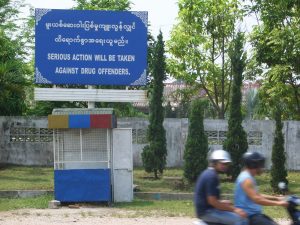Mainland Southeast Asia is bracing for a surge of illegal methamphetamines from eastern Myanmar, as a result of pandemic-related supply gluts and a likely increase in production due to Myanmar’s growing political crisis.
According to a report by the news agency Agence France-Presse published on Friday, anti-narcotics authorities in neighboring Thailand have seized more than 80 million methamphetamine pills, or yaba, in the past six months, a record haul that they blame partly on a supply glut caused by COVID-19.
Despite tanking economies across the region, the pandemic year of 2020 was good for Myanmar’s drug trafficking syndicates, which have long thrived in the contested upland zones of eastern Myanmar. Last year, the United Nations Office on Drugs on Crime (UNODC) reported that the price of methamphetamines in East and Southeast Asia had dropped to its lowest level in 10 years, as the market became overwhelmed with supply.
This increase, according to recent reports, has been driven in part by the fact that the crime syndicates of the Golden Triangle region, where the borders of Myanmar converge with those of Laos and Thailand, have developed the ability to produce the ingredients to manufacture various synthetic drugs, including amphetamine-type stimulants like crystal meth and yaba, as well as synthetic opioids.
According to a Reuters report from February, this innovation has enabled drug traffickers to avoid restrictions on the import of precursors, particularly from China. Since these “pre-precursors” are far less tightly regulated than precursors such as pseudoephedrine and ephedrine, this development has allowed transnational criminal networks to flourish and expand their operations despite the economic recession prompted by COVID-19.
The steady increase in meth production has been reflected in the region’s seizures: Asian anti-drug authorities confiscated a record 139 tons of meth in 2019, up from 127 tons in 2018 and 82.5 tons in 2017, according to UNODC data.
The AFP article also contained a fresh warning from the UNODC that the region should brace for a larger flow of illegal drugs as the crisis in Myanmar deepens, and the formal economy all but collapses amid strikes, protests, and increasingly violent crackdowns by the security forces.
Amid Myanmar’s turmoil, organized crime groups and allied militias in eastern Myanmar will likely take the opportunity to consolidate their control, thriving on the chaos unleashed by the military coup on February 1, Jeremy Douglas, who heads the UNODC office in Bangkok, told the news agency.
“If past actions are an indicator of what’s coming, then we’re likely to see another increase in synthetic drug production,” Douglas said. “The best way to make big money fast is the drug trade, and the pieces are in place to scale up.” As with COVID-19, chaos for Myanmar is opportunity for the region’s drug trafficking syndicates.
Over the past two decades, meth production has jumped up in Myanmar, displacing the opium and heroin production that once made the Golden Triangle a byword for the international drug trade. Most is concentrated in Shan State, especially in regions controlled by dozens of micro-militias linked the Myanmar military, as well as in regions under the sway of non-state armed groups like the United Wa State Army. The International Crisis Group puts the total value of the Golden Triangle drug trade at around $40 billion per year.
This is just one of the many worrying side plots to the crisis presently unfolding in the streets of Myanmar’s towns and cities. Indeed, recent seizures by the Thai authorities suggest that illegal narcotics will remain a crucial part of the country’s political economy, and play an outsized role in whatever constellation of power emerges from the current crisis.

































